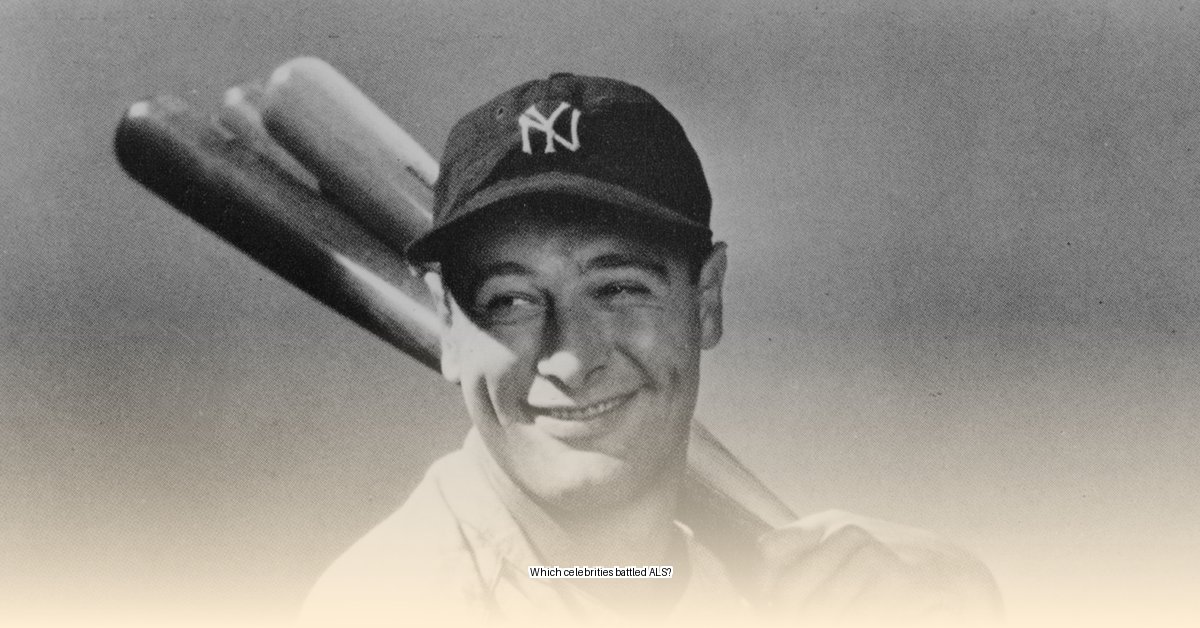Beyond the Diamond: Understanding ALS and Its Impact
Amyotrophic Lateral Sclerosis (ALS), often referred to as Lou Gehrig’s disease, is a progressive neurodegenerative disease affecting nerve cells in the brain and spinal cord. This debilitating illness leads to the loss of muscle control, impacting essential functions like speaking, eating, and breathing. While ALS is relatively rare, its devastating effects have touched the lives of many, including several prominent figures. Exploring the experiences of these individuals can deepen our understanding of the far-reaching impact of ALS and inspire support for those facing this challenging disease. Learning about the lives and legacies of those who have confronted ALS reminds us of the importance of ongoing research and the need for continued compassion and understanding.
The Iron Horse and Beyond: Famous People Who Lived with ALS
The association of ALS with Lou Gehrig, the iconic New York Yankees baseball player, has significantly shaped public awareness of the disease. Gehrig’s diagnosis in 1939 and his poignant “Luckiest Man” speech brought national attention to ALS, forever linking his name to this challenging illness. However, Gehrig’s story is just one of many. Numerous other public figures from diverse backgrounds have also bravely confronted ALS, leaving behind legacies of courage, resilience, and advocacy. Their stories underscore the fact that ALS can affect anyone, regardless of their achievements, social standing, or profession.
One of the most remarkable figures who lived with ALS is Stephen Hawking. Diagnosed in his early twenties, Hawking defied a grim prognosis, living for over five decades and making groundbreaking contributions to theoretical physics and cosmology. His perseverance despite the physical limitations imposed by ALS serves as an enduring testament to the power of the human spirit.
| Name | Profession | Year of Diagnosis (Approximate) | Notable Contributions/Impact |
|---|---|---|---|
| Lou Gehrig | Baseball Player | 1939 | Raised awareness, gave the disease its common name |
| Stephen Hawking | Physicist | ~1963 | Continued research despite physical limitations |
| Paul Cellucci | Politician | 2011 | ALS advocacy and research funding |
| Steve Gleason | NFL Player | 2011 | Founded Team Gleason, ALS advocacy |
| Roberta Flack | Singer | 2022 | Publicly shared diagnosis, raising awareness |
| Jason Becker | Musician | 1989 | Composed music using eye-tracking technology |
This table presents a glimpse into the lives of some of the well-known individuals who have courageously faced ALS. Each story represents a unique journey of resilience, advocacy, and the enduring human spirit. Further exploration of their individual experiences can provide valuable insights into the multifaceted impact of this disease.
The Ripple Effect: How These Figures Shaped the Fight Against ALS
The impact of celebrities and public figures living with ALS extends far beyond their individual stories. Their diagnoses often raise public awareness, prompting crucial discussions and increasing visibility for a disease that might otherwise remain largely misunderstood. This heightened awareness can lead to increased funding for research, the development of supportive resources, and ultimately, offer hope for future treatments and a cure. When someone of prominence shares their experience with ALS, it creates a powerful connection with the public, fostering empathy and encouraging action.
Stephen Hawking’s very public life with ALS likely altered perceptions of the disease, demonstrating that a fulfilling and productive life is possible even with significant physical limitations. His scientific achievements served as an inspiration, proving that brilliance can thrive even under the most challenging circumstances. Similarly, Steve Gleason’s advocacy through Team Gleason demonstrates how personal struggles can be transformed into powerful forces for change, driving innovative research and providing support to those affected by ALS.
The choice of individuals like Roberta Flack to publicly share their ALS diagnosis furthers the conversation about this often-misunderstood disease. This openness helps to demystify ALS and encourages others to seek information, support, and engage in advocacy efforts. It also suggests the importance of creating a supportive and inclusive environment for individuals living with this disease.
The legacies of these individuals are far-reaching. They not only inspire those currently living with ALS but also motivate researchers, medical professionals, and the broader community to continue the fight against this devastating disease. The courage and resilience they displayed serve as a powerful reminder of the strength of the human spirit and the importance of hope in the face of adversity.
While there is currently no cure for ALS, ongoing research continues to explore potential treatments and therapies. Understanding the complexities of the disease is the first step toward developing effective interventions. Organizations like the ALS Association (alsa.org) offer valuable resources and information about the latest research and clinical trials, as well as support services for those affected by ALS and their families. By learning more, contributing to research, and supporting those living with ALS, we can all play a part in creating a future without this devastating disease.
- Divided Meal Storage Containers Make Meal Prep Efficient and Simple - February 14, 2026
- Separated Lunch Containers Keep Different Foods Fresh and Organized - February 13, 2026
- Divided Containers Simplify Meal Prep for Busy Individuals - February 12, 2026










